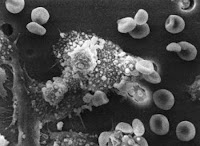 |
| Immune system attacking a cancer cell |
In a study released this week in Science, researchers were able to reveal and reverse cancer's stealth capability.
Researchers hypothesized that stroma, the nonmalignant connective tissue that surrounds tumors, plays a role in helping cancer hide. They discovered that certain stroma cells express fibroblast activation protein (FAP), which is found in areas where the body needs to suppress the immune system (such as the uterus, placenta and areas of inflammation).
To study the possible stealth mechanism, researchers bred transgenic mice with a genetic switch to turn off FAP-expressing (FAP+) cells. They injected the mice with cancer and allowed tumors to become well established. When they turned off the FAP+ cells, 80 to 90 percent of the tumors died within 48 hours. In further study with a group of mice with no immune systems, turning off FAP+ cells had no effect—verifying that the mice's immune systems killed the cancer.
The study is a first step toward new therapies that could one day target FAP+ cells to unleash the immune system's ability to detect and destroy cancer cells.
— Tom DeSanto
Source: Kraman, M. et al., "Suppression of Antitumor Immunity by Stromal Cells Expressing Fibroblast Activation Protein-alpha," Science, 330:827-30, 2010. Image: Susan Arnold



No comments:
Post a Comment